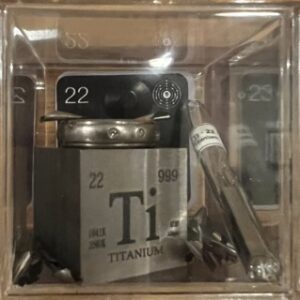Titanium
Atomic Number: 22
Atomic Mass: 47.867 u

Titanium, known for its strength and lightness, is a remarkable element that has become increasingly important in various industries. With the atomic number 22 and symbol ‘Ti’, titanium stands out on the periodic table and in real-world applications. This blog post will explore the properties of titanium, its discovery, and the diverse ways it’s used in our modern world.
Understanding Titanium
Titanium was discovered in 1791 by William Gregor, an English clergyman and mineralogist, and later named by Martin Heinrich Klaproth after the Titans of Greek mythology. It’s known for its high strength-to-weight ratio, corrosion resistance, and biocompatibility. Despite being as strong as steel, titanium is about 40% lighter, making it an ideal material for many applications.
Key Uses of Titanium Today
1. Aerospace Industry
Titanium’s light weight and high strength make it a crucial material in the aerospace industry. It’s used in the manufacture of aircraft, spacecraft, and missiles. Titanium alloys are used in engines, airframes, and other parts where strength, temperature resistance, and lightness are vital.
2. Medical Applications
- Biocompatibility: Titanium is biocompatible, meaning it’s not harmful to living tissue. This property makes it ideal for medical implants such as hip and knee replacements, dental implants, and bone screws.
- Medical Instruments: Its resistance to corrosion makes titanium an excellent choice for surgical instruments and equipment.
3. Automotive Industry
In the automotive industry, titanium is used in high-performance and luxury vehicles. It’s used in components such as exhaust systems, valve springs, and connecting rods. The use of titanium helps reduce vehicle weight, improving fuel efficiency and performance.
4. Sporting Goods
Titanium’s lightness and strength have led to its use in various sports equipment. Golf clubs, tennis rackets, bicycle frames, and even helmet grills for sports like cricket and baseball often incorporate titanium for improved performance and durability.
5. Consumer Electronics
In consumer electronics, titanium is valued for its aesthetic appeal and durability. It’s used in products like watches, eyeglass frames, laptops, and smartphones, offering a sleek, modern look and increased longevity.
6. Construction and Architecture
Titanium is used in construction and architecture for its corrosion resistance and strength. It’s found in exterior cladding, roofing, and other architectural elements, particularly in high-end or unique structures.
7. Chemical Industry
In the chemical industry, titanium is used in reactors, heat exchangers, and piping systems. Its corrosion resistance is crucial in environments where harsh chemicals are processed.
Environmental and Safety Aspects
Titanium is considered a relatively environmentally friendly metal. It’s non-toxic and 100% recyclable, reducing its environmental footprint. The mining and processing of titanium, however, need to be managed carefully to minimize ecological impact.
Conclusion
Titanium’s unique properties of strength, lightness, and resistance to corrosion have made it a key player in advancing technology and industry. From enhancing human health and mobility to driving innovations in aerospace and consumer products, titanium’s role in modern society is both critical and far-reaching. As we continue to explore and innovate, the applications of titanium are bound to expand, solidifying its status as a cornerstone material in the future of manufacturing and design.
Hey kids, ready to learn some amazing things about a super cool element called titanium? It’s not just strong and shiny; titanium has some awesome secrets that you’ll love to discover! Let’s dive into the world of titanium with some fun facts.
- As Strong as Steel but Lighter: Titanium is as strong as steel, but it’s much lighter. Imagine a superhero with steel-like strength but as light as a feather – that’s titanium for you!
- Named After Titans: Titanium is named after the Titans of Greek mythology, who were known for their incredible strength. It’s the perfect name for such a strong and mighty element!
- Not Easily Rusty: Unlike iron, titanium doesn’t rust or corrode easily. That’s why it’s great for things that need to last a long time, even in water or space!
- Spacecrafts Love It: Because it’s light and strong, titanium is used in rockets, spacecraft, and even the International Space Station. It helps them withstand the harsh conditions of space travel.
- Medical Superhero: Titanium is biocompatible, which means our bodies can handle it well. Doctors use titanium for medical implants like artificial hips, knees, and dental implants. It’s like having a bit of a superhero inside you helping you heal!
- Super Sports Gear: Titanium is used in sports equipment like golf clubs, tennis rackets, and bicycle frames. Its lightness helps athletes perform better and swing faster!
- A Touch of Bling: Titanium is also used in jewelry. It’s hypoallergenic, which means it doesn’t cause allergic reactions, and it looks pretty cool too.
- Resistant to Extreme Temperatures: Titanium can handle extreme hot and cold temperatures, making it perfect for use in all kinds of environments – from frozen arctic conditions to the hot insides of jet engines.
- Found in Rocks and Sand: Titanium is not found as a pure element in nature. It’s usually found in rocks and sand. So, next time you’re at the beach, think about how there’s titanium all around you!
- An Element of the Sun: Titanium isn’t just found on Earth; it’s also in the sun and many other stars. It’s literally a star element!
Isn’t titanium fascinating? From making spaceships to healing bones and letting athletes shine, titanium is everywhere, making our world a stronger, lighter, and better place. Next time you see something really strong but light, think about the amazing titanium that might be inside! 🚀🦴🌟
In the element box, there is a density cube that is pure titanium, titanium metal shavings, and a titanium wedding ring.
No media at this time.
 using WordPress and
using WordPress and
No responses yet